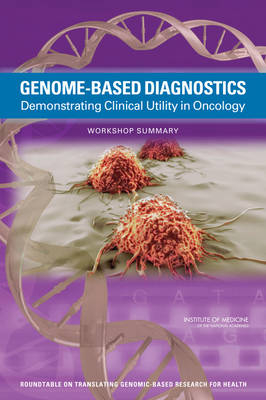
Genome-Based Diagnostics
Demonstrating Clinical Utility in Oncology: Workshop Summary
Seiten
2014
National Academies Press (Verlag)
978-0-309-26959-9 (ISBN)
National Academies Press (Verlag)
978-0-309-26959-9 (ISBN)
Presents the summary of a workshop convened in May 2012 by the Roundtable on Translating Genomic-Based Research for Health and the Center for Medical Technology Policy of the Institute of Medicine to foster the identified need for further sustained dialogue between stakeholders regarding the clinical utility of molecular diagnostics.
Genome-Based Diagnostics: Demonstrating Clinical Utility in Oncology is the summary of a workshop convened in May 2012 by the Roundtable on Translating Genomic-Based Research for Health and the Center for Medical Technology Policy of the Institute of Medicine to foster the identified need for further sustained dialogue between stakeholders regarding the clinical utility of molecular diagnostics. The workshop brought together a wide range of stakeholders, including patients, health care providers, policy makers, payers, diagnostic test developers, researchers, and guideline developers, to identify the challenges and opportunities in advancing the development and use of molecular diagnostic tests designed to guide the treatment and management of patients with cancer.
The sequencing of the human genome has greatly accelerated the process of linking specific genetic variants with disease. These findings have yielded a rapidly increasing number of molecular diagnostic tests designed to guide disease treatment and management. Many of these tests are aimed at determining the best treatments for specific forms of cancer, making oncology a valuable testing ground for the use of molecular diagnostic tests in medicine in general. Nevertheless, many questions surround the clinical value of molecular diagnostic tests, and their acceptance by clinicians, payers, and patients has been unpredictable. A major limiting factor for the use of these tests has been the lack of clear evidence of clinical utility. Genome-Based Diagnostics assesses the evidentiary requirements for clinical utility of molecular diagnostics used to guide treatment decisions for patients with cancer; discusses methodologies related to demonstrating these evidentiary requirements that meet the needs of all stakeholders; and considers innovative, sustainable research collaborations for generating evidence of clinical utility involving multiple stakeholders.
Table of Contents
Front Matter
1 Introduction
2 Setting the Context
3 Perspectives from Stakeholders
4 Tools for Generating and Synthesizing Evidence
5 Advancing Molecular Diagnostics for Oncology
References
Appendix A: Workshop Agenda
Appendix B: Speaker Biographical Sketches
Appendix C: Statement of Task
Appendix D: Registered Attendees
Genome-Based Diagnostics: Demonstrating Clinical Utility in Oncology is the summary of a workshop convened in May 2012 by the Roundtable on Translating Genomic-Based Research for Health and the Center for Medical Technology Policy of the Institute of Medicine to foster the identified need for further sustained dialogue between stakeholders regarding the clinical utility of molecular diagnostics. The workshop brought together a wide range of stakeholders, including patients, health care providers, policy makers, payers, diagnostic test developers, researchers, and guideline developers, to identify the challenges and opportunities in advancing the development and use of molecular diagnostic tests designed to guide the treatment and management of patients with cancer.
The sequencing of the human genome has greatly accelerated the process of linking specific genetic variants with disease. These findings have yielded a rapidly increasing number of molecular diagnostic tests designed to guide disease treatment and management. Many of these tests are aimed at determining the best treatments for specific forms of cancer, making oncology a valuable testing ground for the use of molecular diagnostic tests in medicine in general. Nevertheless, many questions surround the clinical value of molecular diagnostic tests, and their acceptance by clinicians, payers, and patients has been unpredictable. A major limiting factor for the use of these tests has been the lack of clear evidence of clinical utility. Genome-Based Diagnostics assesses the evidentiary requirements for clinical utility of molecular diagnostics used to guide treatment decisions for patients with cancer; discusses methodologies related to demonstrating these evidentiary requirements that meet the needs of all stakeholders; and considers innovative, sustainable research collaborations for generating evidence of clinical utility involving multiple stakeholders.
Table of Contents
Front Matter
1 Introduction
2 Setting the Context
3 Perspectives from Stakeholders
4 Tools for Generating and Synthesizing Evidence
5 Advancing Molecular Diagnostics for Oncology
References
Appendix A: Workshop Agenda
Appendix B: Speaker Biographical Sketches
Appendix C: Statement of Task
Appendix D: Registered Attendees
1 Front Matter; 2 1 Introduction; 3 2 Setting the Context; 4 3 Perspectives from Stakeholders; 5 4 Tools for Generating and Synthesizing Evidence; 6 5 Advancing Molecular Diagnostics for Oncology; 7 References; 8 Appendix A: Workshop Agenda; 9 Appendix B: Speaker Biographical Sketches; 10 Appendix C: Statement of Task; 11 Appendix D: Registered Attendees
| Verlagsort | Washington |
|---|---|
| Sprache | englisch |
| Maße | 152 x 229 mm |
| Themenwelt | Medizin / Pharmazie ► Medizinische Fachgebiete ► Onkologie |
| Studium ► 2. Studienabschnitt (Klinik) ► Humangenetik | |
| ISBN-10 | 0-309-26959-8 / 0309269598 |
| ISBN-13 | 978-0-309-26959-9 / 9780309269599 |
| Zustand | Neuware |
| Haben Sie eine Frage zum Produkt? |
Mehr entdecken
aus dem Bereich
aus dem Bereich
Eine sehr persönliche Geschichte | Der New York Times-Bestseller
Buch | Softcover (2023)
Ullstein Taschenbuch Verlag
21,99 €
Die revolutionäre Medizin von morgen (Lifespan)
Buch | Softcover (2020)
DuMont Buchverlag
16,00 €


